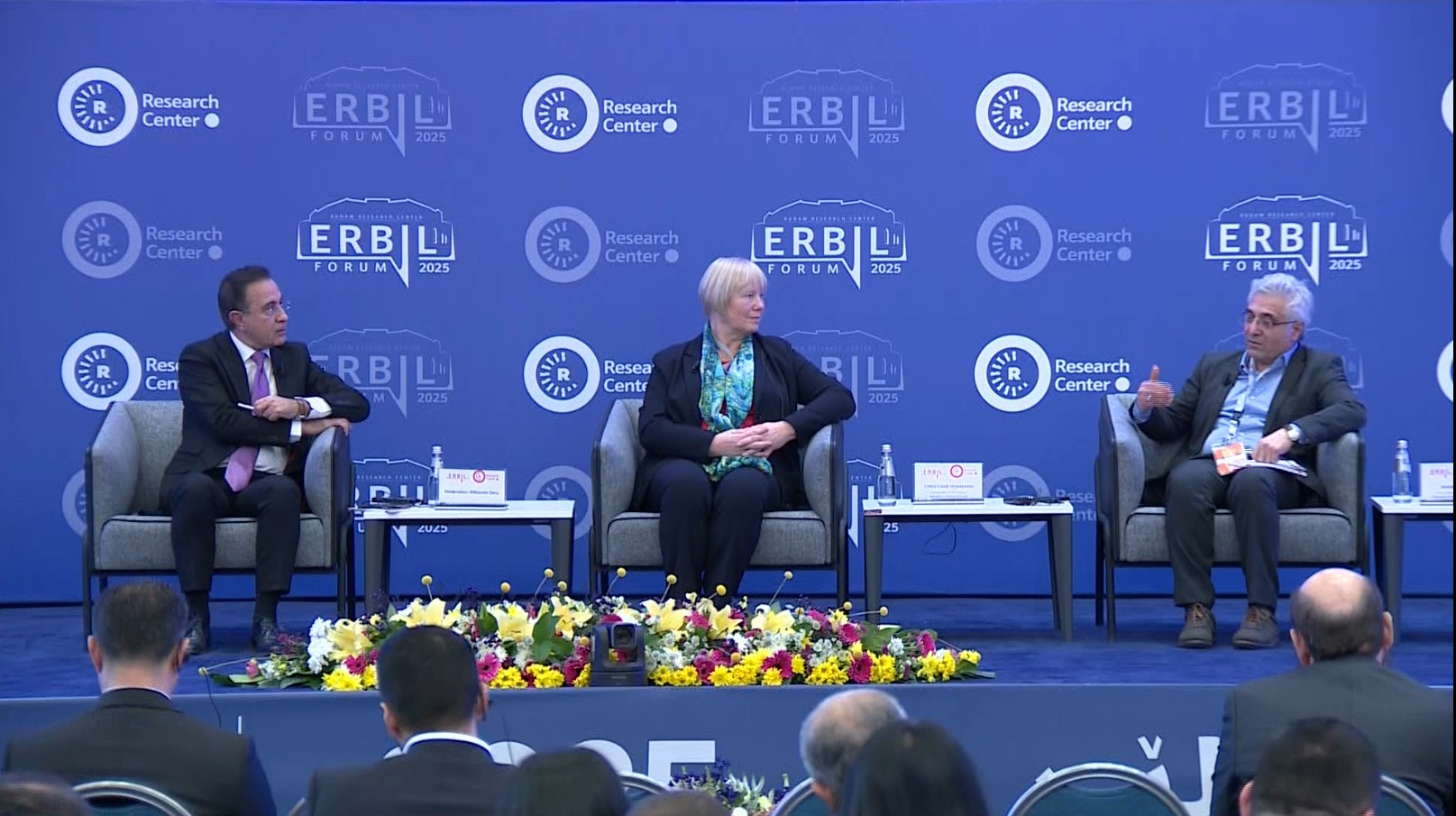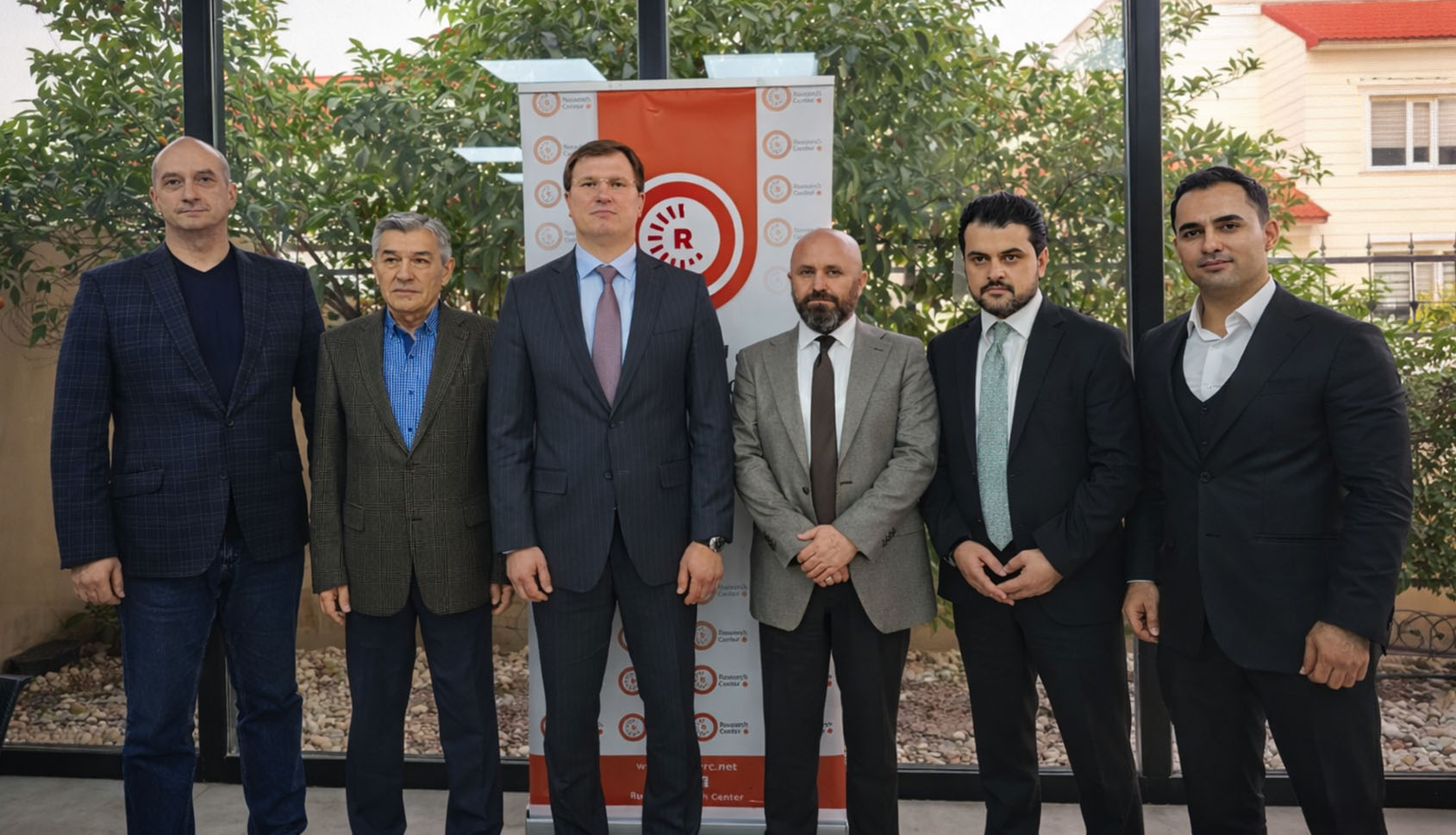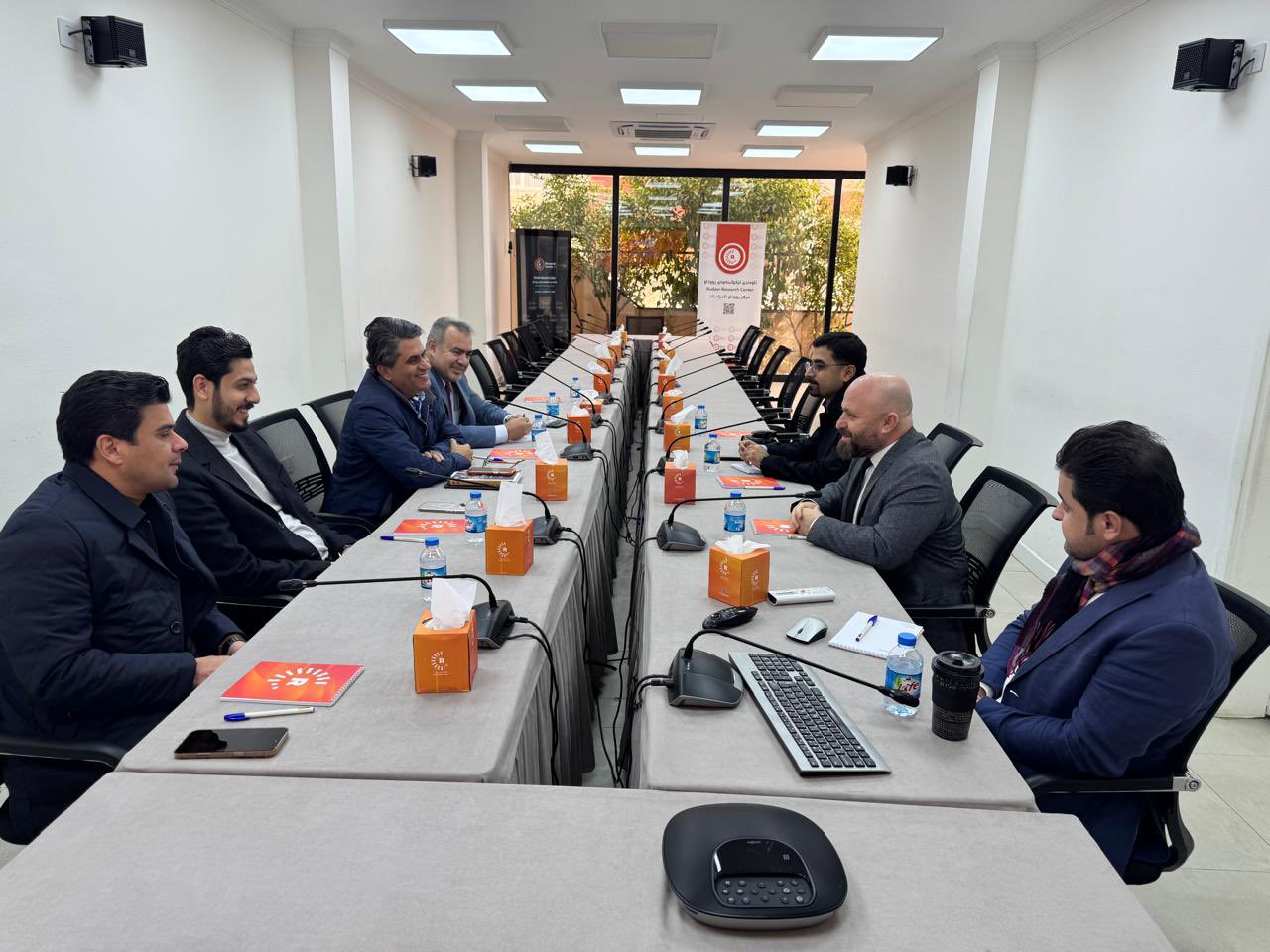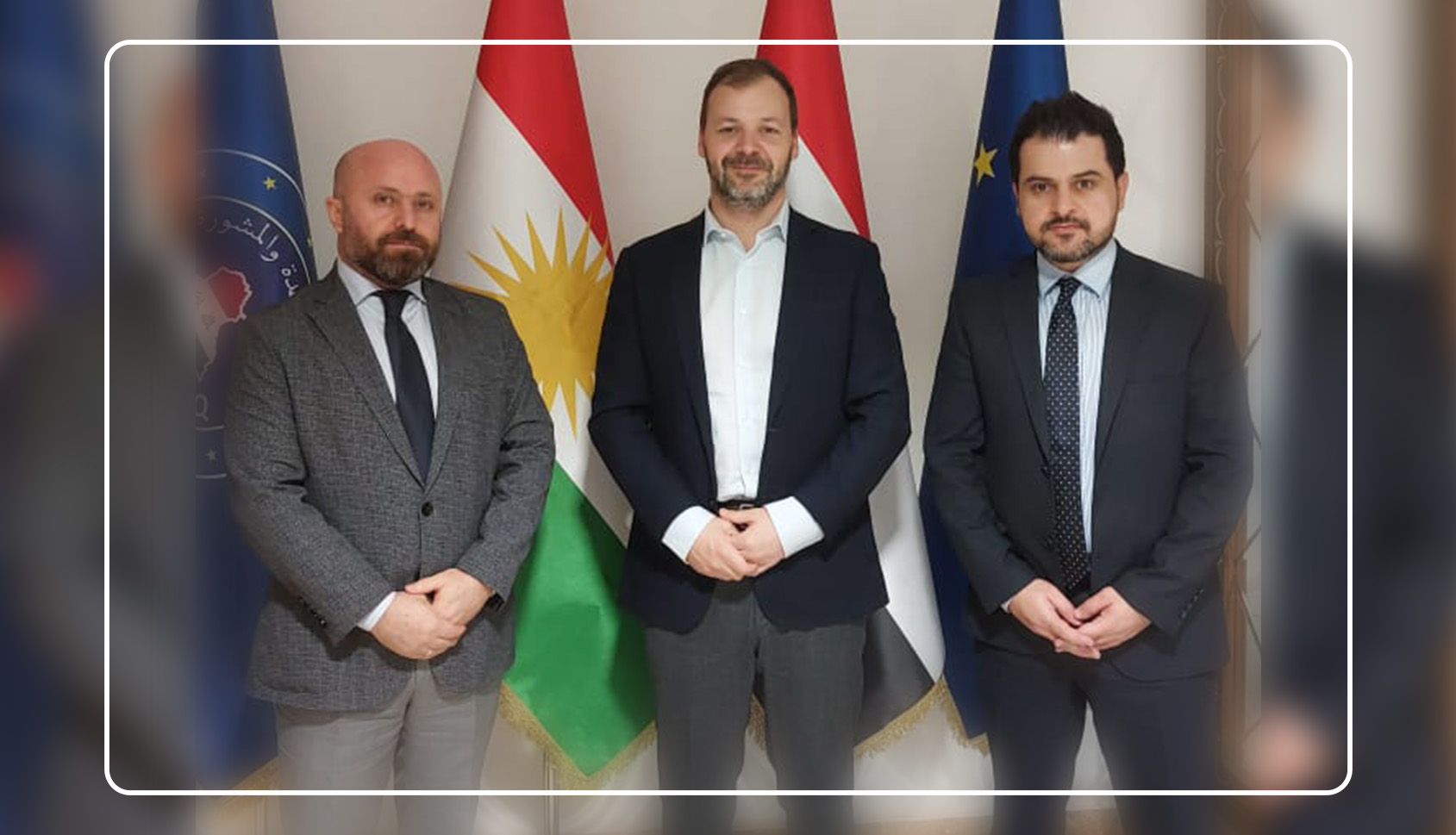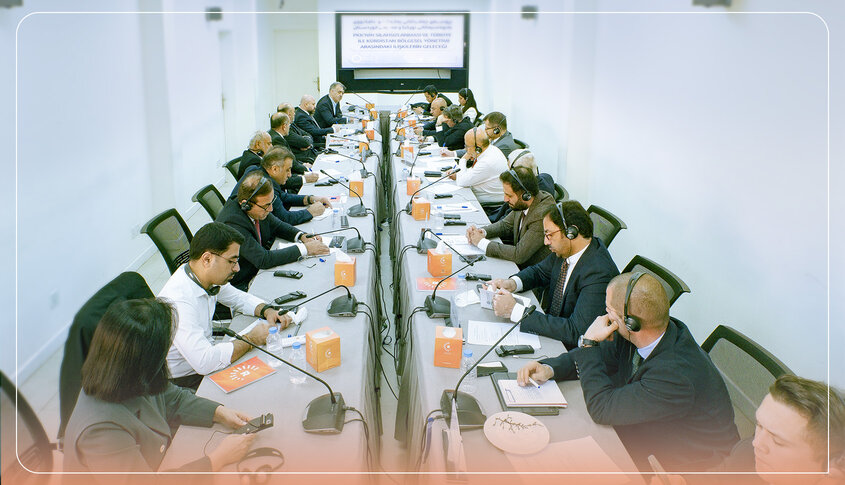Panel 02: Post-Assad regime: What can Western governments do to protect Syrian minorities' rights?
09-04-2025
Dilbixwin Dara:
Welcome, everyone. In this panel, we will discuss the situation of the communities in Syria after the fall of the Assad regime. As you know, the main community in Syria, after the Arabs, are the Kurds. The Kurds are the second-largest community in Syria, making up 15 percent of the population, which means there are approximately three to four million Kurds in Syria. Their geography and influence, as you know, is quite unique, stretching from Afrin to Derik, and Derik to Hamko, on the border of Southern Kurdistan.
The panel includes the German Ambassador to Iraq, Mrs. Christiane Hohmann, and Mr. Siamend Hajo, the Director of the Syrian Kurdistan Front’s Office for External Relations. Welcome to both of you and welcome to all of Rudaw's guests.
Dilbixwin Dara:
Madam Ambassador, first of all, I would like to ask about Germany's strategy towards the new Syrian government headed by Ahmad Shara. What is Germany's strategy towards the communities living in Syria?
Christiane Hohmann:
First of all, thank you very much for having me. Congratulations to everyone who has made it this far today. It’s already been a long day, and these are the people who have the necessary energy and stamina to stay on.
Second, as you can already tell from the title, I am not the top Syrian expert in the German government, simply because I am the ambassador to this country, and unfortunately, the top experts couldn’t make it. Nevertheless, I will try to address the issues you’ve just raised.
I think it’s important to note that this is not a solely national German approach, but rather one representing the international community, especially the member states of the European Union, along with other partner countries.
First and foremost, I want to congratulate the Syrian people, who now face a huge opportunity but also enormous challenges. The dictator is gone, but now comes the very, very tough process of rebuilding and establishing a modern, democratic Syria—one that, as you referenced, includes every member of Syrian society. The richness of Syria lies in its diversity. It is a fact that there are several religions and ethnic minorities, and they should all be involved.
This is a comprehensive process in which everyone should have a say in what the Syria of the future should look like. This is why the national dialogue is so important—it aims to involve all actors. They should all have a say and be able to contribute. Ultimately, it is up to the Syrian people—everyone—to define their future. This is why the participatory process that is currently being established is so crucial, with the first consultations already having started. If you look at what was decided at the Paris Conference on Syria, you can see that inclusiveness is one of the most important criteria in decisions on how we can support a future for Syria.
The challenges are abundant, so this will be a step-by-step process, and, of course, it is a process of conditionality. As you may know, the EU foreign ministers took the next step this Monday by lifting or suspending some sanctions against Syria to help kick-start the economy. Because unless you have a functioning economy, there is little you can do in state-building, and therefore, you need to focus on that. But it is a suspension, which means that if things do not move toward an inclusive Syria, there is the possibility of reinstating sanctions very quickly.
Let me stop here.
Dilbixwin Dara: Another question. Although the fighting in the Kurdish areas of Syria is not as intense as before, there are still attacks by armed groups on the Tishrin Dam and on the Syrian Democratic Forces (SDF). Turkey supports these armed groups, while the SDF is part of the international coalition against ISIS, which includes France, the United States, and many other European countries. As allies of the SDF in the fight against ISIS, how can you prevent these attacks on the Kurds?
Christiane Hohmann: That’s a significant challenge, and we are not directly involved on the ground. One of the key points is to ensure there is an inclusive political process that involves all actors, so that a compromise can be found that works for everyone. This is about one country, so that is one of the elements. The rest of the security issues are currently being addressed by the SDF on the ground, with support from the coalition.
I don’t have a crystal ball to predict what will happen in two or three months. This is a step-by-step process, and we need to see how the state can project its power. This is also part of the ongoing negotiations between the central government and the SDF, which is another parallel process, but again, involving joint actions.
Dilbixwin Dara: Very good. Mr. Siamend, you place great emphasis on protecting the rights of minorities and different communities in Syria, such as the Kurds, whom I mentioned earlier. There are at least four million Kurds in Syria. Let's assume, except for the Kurds in Latakia, Hama, Homs, Dara, Deir ez-Zor, Raqqa, and other areas—although Dr. Azad repeatedly says that Deir ez-Zor is part of Kurdistan—do you believe that federalism can fully protect the rights of the Kurds and other communities in Syria?
Siamend Hajo: You know, we must understand that federalism protects Kurdish rights. Moreover, in my opinion, federalism also serves the public interest of Syria as a whole. What is federalism? The federal system states that power should be divided. Syria’s main problem has always been that power has been concentrated in the hands of a small group since its inception. The federal system advocates for decisions to be made at lower levels—at the regional, village, and city levels. This is very important. It is not only good for the Kurds; it is good for all communities in Syria.
For example, if a school is to be built, the people of Deir ez-Zor know better where it should be located than people in other parts of Syria. We need to bring Syria back to a system of partnership, where federalism is not just important for the Kurds, but it is necessary and beneficial for all of Syria. It empowers the entire country.
Federalism has various forms. Each region determines its own version of federalism. For instance, we know that the federal system in Germany is different from that in other countries, such as Switzerland, the United States, and India. Therefore, it is crucial to adapt the form of federalism to the country's history and its particular circumstances. As I mentioned, power in Syria has been in the hands of a small group. What should we do? We should work to divide that power.
An interesting example is the Federal Republic of Germany. The German ambassador is here, and perhaps she can explain why Germany became a federal state. Both the main parties, the Social Democratic Party and the Christian Democratic Union, wanted Germany to return to its former system of governance and did not initially support federalism. However, the United States, the United Kingdom, and France imposed it. They believed that the federal system was necessary because we knew that Germany started World War II after a small group had taken power. It’s true that Syria has not experienced a world war, but the concentration of power in the hands of a small group has caused disaster. Therefore, we must be able to divide power, and federalism will help achieve that. On the other hand, federalism protects Kurdish rights because, without it, there is no trust.
The former rulers, those who came to power, still claim to support equality among citizens. However, the equality of citizens and democracy alone do not necessarily protect the rights of a nation. If true equality exists, guaranteeing the practice of language is of paramount importance for us as Kurds. Democratic countries must ensure the rights of marginalized groups—those who have suffered historically and been treated unfairly. For example, many democratic countries have quotas for women.
On the other hand, there has been reform and progress in the equality between men and women. However, some argue that because men typically make the decisions and women are not advancing at the same rate, this should come to an end. The same issue applies to the Kurdish situation in Syria. When we examine the Arab administration in Syria, we find that every institution established has a very small number of Kurds. Take, for instance, the Constitutional Committee in Geneva. During negotiations, only one out of forty-five people present in Geneva was a Kurd. Similarly, those who have just come to power and established an interim government did not include a single Kurd. When the national congress was held, only six Kurds out of six hundred people attended. This demonstrates the need for constitutional guarantees for the Kurds, and I believe federalism is the only way to secure these guarantees.
For instance, a unified Kurdish region, governed and protected within the constitution, is a possible solution. Federalism is the only way for Syrian Kurds to achieve their rights. A Kurdish autonomous region could function similarly to the five autonomous regions in Italy, which is a centralized country. Many Syrians claim that the reality requires a centralized system, but this is not necessarily a problem. We can have a majority Kurdish-speaking region that is part of a centralized Syria, but we must have an autonomous region. The Kurds demand this. Other groups in Syria, such as the Alawites, also argue that their rights must be protected.
In reality, we could have a central region along with three or four autonomous regions. However, I do not believe the current group in power can understand this, as their views are not far from those of the Ba'ath Party. They want a single Arab identity and do not recognize the existence of Kurds.
Furthermore, the new leadership has not engaged with the Kurdish political movement; only the Kurdish political movement has engaged with them. Ahmed Shara, for instance, has been seen taking photos with an Arab TikTok user and another celebrity, but so far, he has not welcomed any Kurds—neither politicians nor activists. This indicates that they intend to exclude Syrian Kurds from the political process.
Dilbixwin Dara:
Well, Mr. Siamend, Syria has not welcomed any Kurds. The Kurds who went to Syria met with some lower-level officials, but not high-level ones. Is the problem with the Kurds—meaning that the Kurds are not ready to negotiate with Syria, or does Syria really not want to treat the Kurds as a nation?
Siamend Hajo:
On both sides, many Kurdish delegations have gone to Syria and met with Syrian officials. Even Mazloum Abdi has negotiated and met with them. But let’s observe that Syria does not want to appear with the Kurds. As I said earlier, they take pictures with everyone else, but not with Mazloum Abdi. This shows that if Kurdish negotiations were important to them, they would not treat them in this way.
Indeed, they have problems with the Kurds in terms of their beliefs, but on the other hand, we Kurds ourselves have a significant shortcoming. When the war for the liberation of Syria began, within two months, they were able to take control of three-quarters of Syria, form an interim government, and organize a national congress. But we, the Syrian Kurds, and our political parties could not even sit down and define what we wanted from the government. This is a major problem.
The Kurdish political movement has long needed to send a unified Kurdish delegation with a clear policy for Syria, but we have not done so, and this is a significant mistake within the Kurdish political movement in Syria.
I remember when the Syrian revolution started, the Kurdish political movement was able to come together in a short time and create a common political vision, an administrative body, and a program. However, later new groups emerged, even when there were only two main groups. More importantly, at the beginning of the revolution, there was a new regime, but today Syria is deciding what its future will look like. We, the Syrian Kurds, still cannot present a clear political vision.
In my opinion, the two main groups—the Syrian Kurdish National Council and the PYD (Democratic Union Party)—bear a great responsibility, and I don’t understand why they separate the interests of the Syrian Kurds. Both groups should have reached a political agreement and agreed on a unified political vision long ago. This has not happened yet, and I do not see this happening in the future.
Dilbixwin Dara: Very well. Dear Ambassador, how do you see the future of Syria? How will you approach Syria moving forward? How do you view Sharaa’s government, and how will you engage with this government in the future? For instance, you have not opened your embassy in Syria yet. What is the reason for that?
Christiane Hohmann: What we have all witnessed is that, of course, everyone listens. We listen to announcements, and we listen to political plans. But I’m not the first to say this—such announcements must be followed by actions. Announcing something is one thing, but the real question is: is what has been announced actually being implemented? The inclusive process is crucial, and I wanted to emphasize what you just said. The stronger the minorities speak with a united voice, the more likely they are to be heard. The size of the minorities may vary, and there is a risk that one may be larger than the others, but this is exactly how you can amplify your voice in such political processes.
I know this is not an easy task, but it is one of the roles we play as foreign actors. We not only listen but also work extensively with the diaspora, as the diaspora has a significant role to play. It’s about creating connections. And, of course, we need your input to support a political consensus that is as broad and inclusive as possible, to build a future Syria that has a place for everyone. I believe this is the core element: you don’t want to exclude anyone again. The inclusive process is necessary to kick-start both the economy and the political system—one in which the Syrian people feel represented and not excluded.
The decisions must be made by the Syrian people, not by us. However, we can be the ones who listen to your concerns, hear about your future plans, and understand what you want to see. This is why our approach is cautious. Yes, we listen, we hear, but we also want to see the actions that will lay the groundwork for the next steps.
Dilbixwin Dara: For example, you have not yet removed Ahmad Shara from the terror list, and he, along with many other governors and ministers in the new Syrian government, is still on the terror list maintained by Germany, the European Union, and the United States. Additionally, both military commanders and HTScommanders are all classified as terrorists, yet you are treating them officially. What do you think about this? On the one hand, they are considered terrorists and are not removed from the terror list. On the other hand, you are treating them as non-terrorists in an official manner. Why is this?
Christiane Hohmann: I think we are all taking a cautious approach in this matter. There is no national terrorist list, so there is no specific German terrorist list—it is a European list, which means it requires a decision from the EU. It’s not a national decision. But, as I mentioned earlier, we hear announcements, but we also want to see proof of those actions in reality. We share the cautious approach that our partners in the region are taking. We want to see where this process is headed. Does it truly go in the direction that has been announced? That’s why we are so eager to see the outcomes of the national dialogue because that is a core element in moving the country forward. Are we moving toward a constitutional process to create a new democratic constitution? What about elections, and so on? We are in a very difficult transition period, where nothing is set in stone yet. So our positions are not fixed; they are flexible, and we will react accordingly, depending on what happens on the ground.
Dilbixwin Dara: Well, thank you very much. Now, we can take questions from the audience. I will take three questions.
Question 1 for Ambassador Hohmann:
Thank you, Madam Ambassador. We know that Germany is one of the most powerful countries with a strong economy. If, for any reason, the U.S. were to leave Syria, what would be Germany’s and the EU’s position? Would you allow the Syrian government to target the Syrian Democratic Forces (SDF) under the pretext of fighting terrorism?
Question 2 for Ambassador Hohmann:
Thank you, Madam Ambassador.
First of all, I am a researcher in political economy. If I may summarize Your Excellency's perspective on the Syrian situation, my question is: Do you, as Germany, believe that we need a new Berlin-Baghdad project in light of the changing dynamics of the Syrian situation?
This is my first question.
Secondly, if we compare the situation in Syria to two centuries ago, we can see that most conflicts have either subsided or been resolved, especially in the context of Syria's crucial geopolitical position on the global stage. However, there is a significant difference between then and now. Why? Because the economic situation has changed. Moreover, both regional and global powers are now involved in Syria, negotiating issues related to minorities and human rights. Do the Germans believe that UN regulations need reform to establish new rules for Syria?
Why? Because if we compare the situation before and after the Cold War, many differences are evident. Do you believe the P5 members of the UN Security Council need to introduce new regulations to better address minority rights in Syria?
My third question is: As His Excellency President Nechirvan Barzani mentioned, the Kurdistan Regional Government (KRG) has not been involved in peace negotiations. Could the KRG play a role in peacebuilding, particularly in the reconstruction and protection of the human rights of minorities?
If we, as the Kurdistan Region, were to take on such a role, how could we support regional countries in rebuilding peace through economic growth? Compared to two centuries ago, we now have institutions, a parliament, and a government. With these resources, how can we contribute to peacebuilding while fostering economic development?
Thank you very much.
Question 3 for Ambassador Hohmann:
My question is for Ambassador Hohmann. Thank you for your speech. We know that Germany accepted a significant number of refugees during Chancellor Angela Merkel’s tenure. Now, as the German government considers the possibility of deporting some of these refugees, what criteria will be used to determine whether a country is considered safe for their return? Will the decision be based on economic conditions, safety, political stability, or a combination of these factors?
Question 4 for Ambassador Hohmann:
My question to the German Ambassador is regarding the Kurdish community in Syria, which is seeking to declare federalism. What will Germany’s position be on this demand?
Question 5 for Ambassador Hohmann:
I always walk around like a blind Hafiz, wondering where the Kurdish issue is headed. You are Kurdish allies, you support the Kurds, you’ve attracted many Kurds to Germany, and you’ve benefited from their strength. What do you think about the Kurdish issue in Syria? The Kurds in Syria fought ISIS, they fought Turkey, and they are fighting for survival. What do you think about the female fighters who fought and became part of history? Where are the Syrian Kurds headed now?
Dilbixwin Dara: Thank you very much. All the questions were directed to the German Ambassador. There are at least two million Kurds in Germany, a large number, and three-quarters of them grew up in Germany. For example, Mr. Siamend Hajo, how old were you when you went to Germany?
Siamend Hajo: Eighteen years old.
Dilbixwin Dara: Most Kurds in Germany are from West Kurdistan, at least two million Kurds, mostly Kurds from West Kurdistan. People in Germany have high hopes for Germany, and Kurds really expect Germany, regardless of the party, government, or coalition, to do something for the Kurds. All questions were directed to you, dear Ambassador Hohmann, please.
Ambassador Hohmann:
All right, that was a very long list. I hope I remember all the questions.
To address the first question, unfortunately, I don’t have a crystal ball, so I will not engage in speculation. When situations like this arise, the allies come together because none of us is in this alone. Therefore, I cannot provide an answer to this question, as it would be purely speculative. I apologize for that.
Regarding the economy—you know it well. The key phrase here is simply: “The economy.” If we truly want to do something beneficial for the Syrian people—regardless of ethnicity or religion—it comes down to economic welfare. It is about creating opportunities to earn a decent living, to feed one's family, and to feel at home. This is where the Kurdish community can contribute—through economic ties. These connections have always existed; they are not new, nor do they need to be reinvented. While there may have been interruptions and difficulties, the people-to-people, human-to-human connections are crucial in seeing a light at the end of the tunnel.
Economically, the situation in Syria is, of course, very difficult, and it requires great resilience to endure it. At the same time, Iraq, as a country, has experienced similar hardships and has accumulated significant experience in navigating economic transitions. This experience could be valuable in supporting the development of a healthy and stable economy just across the border. Given that both regions are interconnected, inter-regional trade is a key factor in this process.
As for the question regarding the future state structure of Syria, that is not for us to determine. This is the same as the previous question—it is not our decision to make. The structure of the Syrian state is a sovereign decision of the Syrian people. They alone will decide how they want to organize their country. This is why national dialogue is so crucial. No external force can dictate or impose a particular system.
In terms of the relationships within Kurdish areas, I cannot provide an answer, nor would it be appropriate for me to do so. That is not for us to decide. Every country chooses its own system. For example, Germany is a federal state due to very specific historical reasons, but every nation must make its own choices regarding governance. No external party can impose a structure—it must be determined by the people on the ground.
Dilbixwin Dara: Thank you both very much. Mr. Siamend, any final thoughts?
Siamend Hajo: I would like to thank Rudaw and wish you continued success.
Dilbixwin Dara: Our guests today were Mrs. Christiane Hohmann, the German Ambassador to Iraq, and Siamend Hajo, Head of the Office for External Relations of the Syrian Kurdistan Front. Thank you both for joining us. Goodbye, and thank you to all our attendees. Stay well and happy!

